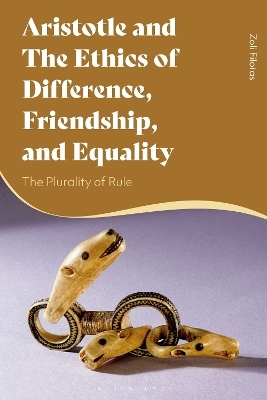
Aristotle and the Ethics of Difference, Friendship, and Equality
The Plurality of Rule
Seiten
2023
Bloomsbury Academic (Verlag)
978-1-350-25993-5 (ISBN)
Bloomsbury Academic (Verlag)
978-1-350-25993-5 (ISBN)
Connecting several strands of Aristotle’s thought, Zoli Filotas sheds light on one of the axioms of Aristotle’s ethics and political philosophy – that every community has a ruler – and demonstrates its relevance to his ideas on personal relationships.
Aristotle and the Ethics of Difference, Friendship, and Equality reveals a pluralistic theory of rule in Aristotle’s thought, tracing it through his corpus and situating it in a discussion among such figures as Gorgias, Xenophon, and Plato. Considering the similarities and differences among various forms of rule, Filotas shows that for Aristotle even virtuous friends must exercise a version of rule akin to that of slaveholders. He also explores why Aristotle distinguishes the hierarchical rule over women from both the mastery of slaves and the political rule exercised by free and equal citizens. In doing so, he argues that natural and social differences among human beings play a complex, and troubling, role in Aristotle’s reasoning. Illuminating and thought-provoking, this book reveals Aristotle's ambivalence about political relations and the equal treatment they involve and offers an engaging inquiry into how he understood the common structures of human relationships.
Aristotle and the Ethics of Difference, Friendship, and Equality reveals a pluralistic theory of rule in Aristotle’s thought, tracing it through his corpus and situating it in a discussion among such figures as Gorgias, Xenophon, and Plato. Considering the similarities and differences among various forms of rule, Filotas shows that for Aristotle even virtuous friends must exercise a version of rule akin to that of slaveholders. He also explores why Aristotle distinguishes the hierarchical rule over women from both the mastery of slaves and the political rule exercised by free and equal citizens. In doing so, he argues that natural and social differences among human beings play a complex, and troubling, role in Aristotle’s reasoning. Illuminating and thought-provoking, this book reveals Aristotle's ambivalence about political relations and the equal treatment they involve and offers an engaging inquiry into how he understood the common structures of human relationships.
Zoli Filotas is Assistant Professor of Philosophy at the University of South Dakota, USA.
Introduction
1. The Problem of Freedom and Persuasion in the Fifth and Fourth Centuries
2. Admonishment, Slavery, and the Generic Definition of Rule
3. Kinds of Community, Kinds of Rule
4. Political Rule, Equality, and the Good
5. Equalizing Citizens
Conclusion
Bibliography
Index
| Erscheinungsdatum | 08.03.2023 |
|---|---|
| Verlagsort | London |
| Sprache | englisch |
| Maße | 156 x 234 mm |
| Themenwelt | Geisteswissenschaften ► Philosophie ► Philosophie Altertum / Antike |
| ISBN-10 | 1-350-25993-4 / 1350259934 |
| ISBN-13 | 978-1-350-25993-5 / 9781350259935 |
| Zustand | Neuware |
| Haben Sie eine Frage zum Produkt? |
Mehr entdecken
aus dem Bereich
aus dem Bereich
mit Sokrates, Seneca, Platon & Co. im Gespräch
Buch | Hardcover (2023)
FinanzBuch Verlag
CHF 25,20


